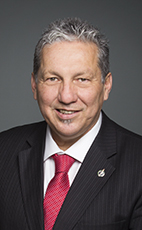Summary
Local Journalism Initiative Reporter
Windspeaker.com
In accepting funding from the federal government to help revitalize the Michif language in Manitoba, the Manitoba Metis Federation (MMF) pushed the need for a nation-to-nation approach in the Indigenous Languages Act.
“Going forward, the Metis Nation asserts that the implementation of the Indigenous Languages Act should be grounded in the framework of a Canada-Metis Nation Michif language accord,” said Andrew Carrier, minister responsible for Michif languages for the MMF.
“This is consistent with our rights to self-determination, the nation-to-nation relationship that exists in the Canada-Metis Nation Accord, and the purpose of all of the Indigenous Languages Act itself.”
Steven Guilbeault, Canadian Heritage minister, said Canada is trying to adapt the funding program.
“We’re trying to be very mindful of the wide array of needs for different Indigenous languages. Some are still very well spoken; some are very endangered. So we’re trying to move away from the conventional government approach of one-size-fits-all, because in this case there’s lots of different sizes and we need to adapt our programs to meet those needs,” the minister said during a virtual press conference on Oct. 15.
The Michif language is “critically endangered,” said Carrier, and there is “an urgency” to act now as almost all fluent Michif-speakers are 65 years of age or older.
Carrier recounted as a child listening to his grandfather speaking Michif to his father. But at six years of age when Carrier began attending Catholic day school, he and other Metis children were punished by the nuns for speaking their language.
“(The nuns) shamed us from speaking our Michif language that was embedded into our hearts and minds from our parents and our ancestors,” he said.
“The revitalization is so important because it’s part of who we are and without our language, which is one of the cornerstones of our culture, who are we?”
On Thursday, Guilbeault announced that $487,000 in funding had been awarded to the Louis Riel Institute, the Northwest Metis Council (part of MMF), and Two Sisters Language Resources and Applied Linguistics. The funding is dedicated to Michif and Saulteaux languages revitalization.
Guilbeault said more funding would be awarded for Michif language work and for other Indigenous languages in the province.
This funding will be used in a variety of ways, including the creation of resources to build language capacity and to digitize spoken samples from fluent Michif speakers.
Carrier said the funding would help the MMF, which is currently undertaking surveys to determine where Michif is spoken.
“So as we are preserving our Michif language, we are putting roots back into our communities, into our culture. It is truly an important process and we must not forget who we are, to recognize and be proud of our Indigenous roots as we are proud of our other European roots,” he said.
“We are in the process of a great awakening in Canada among Indigenous people, especially among the Metis where we are no longer going to be silent.”
Virtual consultations will be held between the federal government and the Metis, First Nations and Inuit peoples for the implementation of the Indigenous Languages Act, the development of an Indigenous languages funding model, and the roles and responsibilities of the office of the commissioner for Indigenous languages.
The Metis National Council hosted two virtual engagement sessions in early October to get input from Metis Nation citizens on those points.

In a separate matter, Northern Affairs Canada Minister Dan Vandal, who also participated in the virtual announcement of the funding, was asked by the media to comment on the state of the relationship between Manitoba and the MMF.
Vandal called out the Pallister government for referring to MMF as a “special interest group.”
Premier Brian Pallister made the comment in 2018. In response, the MMF passed a resolution unanimously calling for Pallister to apologize. He never did.
“I think in fairness to the Metis federation, they’re fighting for the rights of the people who elect them and who they represent and frankly some of the past words that have come out of the provincial government… really do not reflect the Canadian reality on Canada-Metis relations,” said Vandal
“In the past the province of Manitoba have called the Manitoba Metis Federation ‘a special interest group.’ They are not a special interest group. They are a rights-bearing Metis Nation of Canada and I think obviously there needs to be some education on the provincial side.”
He called on the MMF and the province to “come to the table” to discuss their issues.
